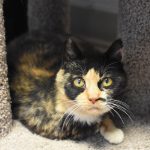 Cats have decreed: you are not too far gone.
Cats have decreed: you are not too far gone.
Cats poke and ponder: perhaps you have not gone far enough.
Over the edge. Out of the burrow. Into the fray and the play and the prayer that is life.
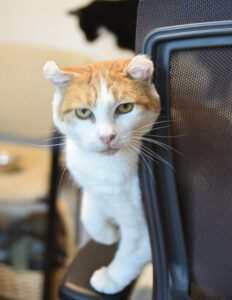 We forget, sometimes, what a pantheon of ancients surrounds us at Tabby’s Place. It’s easy to let the “cat age conversion chart” slip your mind when spaghetti-legged grandmothers like Honey hurtle through the air like zestballs, and technicolor tortoiseshells like Agnes address you with ageless child-eyes.
We forget, sometimes, what a pantheon of ancients surrounds us at Tabby’s Place. It’s easy to let the “cat age conversion chart” slip your mind when spaghetti-legged grandmothers like Honey hurtle through the air like zestballs, and technicolor tortoiseshells like Agnes address you with ageless child-eyes.
But the truth is, we walk among colonnades of age, pillars of time, pioneers of geriatric grandeur. Our Director of Operations’ office alone is home to a combined 720 years of cat. (You think I am exaggerating. You are not incorrect. But you are only scantly correct.)
They are past the age when one could hope to become an Olympic speed-skater. They are no longer eligible for Emerging Leader awards. The time has passed for being the “youngest author/astronaut/competitive peanut butter sandwich eater ever to…” Thinking with our gnarly little human neurons, it would be easy to conclude that their misty eyes have evicted some of the sillier species of “hope.”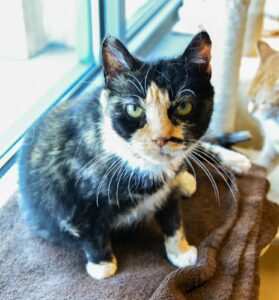
But cats, even cats of extraordinary age, especially cats of extraordinary age, do no such thing.
Here I return to Danielle’s office, a veritable Home For The Extreme Aged. (NO I DO NOT MEAN DANIELLE. Please do not get me fired.) If ever a clowder of cats should have glumly given themselves over to the lash of It’s Too Late, it would be Agnes, Toulouse, and Betty. At their age, one is lucky to get a good night’s sleep, grateful for a week when our vet team does not inflict Obnoxiously Mean Things, fortunate just to have a warm place to lay and a tolerable roommate with whom to share one’s dreams and toilets.
We underestimate the aspirations of aged cats.
I have understated the enormity of Agnes’s eyes. Hers are starlights that could cast out deep darkness; hers are lifelights that are not afraid of death or tuna shortages; hers are firelights that fight the fog that even younger creatures let in through our cracked windows.
Hers are eyes with a matchless motto: Ask, and it will be given to you; seek, and you shall find; knock, and the door will be opened.
At age 15, Agnes is still expectant.
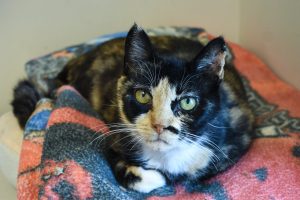 She expects all of yesterday’s good — the bed and the peace and the friend and the fish mush — and dares to ask for more. She lives with the confidence of a creature who believes there is more good ahead than behind. She knows many things (summer always comes home from its nine-month vacation with souvenirs; the vet team isn’t actually evil; the cans with the tiny maggot-like shreds of cheese are the best), most of all the fact that it would be folly to stop dreaming.
She expects all of yesterday’s good — the bed and the peace and the friend and the fish mush — and dares to ask for more. She lives with the confidence of a creature who believes there is more good ahead than behind. She knows many things (summer always comes home from its nine-month vacation with souvenirs; the vet team isn’t actually evil; the cans with the tiny maggot-like shreds of cheese are the best), most of all the fact that it would be folly to stop dreaming.
Life didn’t teach her this. We’re speaking of a cat who knew the cold and the confusion of a decade outdoors, her most beautiful years unseen, her best energies spent on sheer survival. It would be understandable if she kept her expectations small and her curtains drawn.
But such is not the way of cats.
They know what we forget: the universe is open, and the door of mercy is open, and the Weaver’s hand is open, and the future itself is a grand dilated eye that will allow in all the light we dare to dream of.
But we have to dare to dream, to ask, to seek, to knock, to put ourselves out there on the terrifying empty pages, believing the best part of the story is yet to be written in soft, swooping handwriting.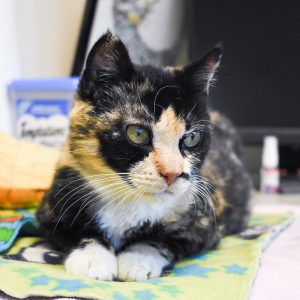
There are a million ways to stop short of the seeking that will save us. For decades, I kept a gratitude journal, a diligent daily list of precisely five blessings that kissed me each day. It was a healthy and wholesome practice until it became a burden, the holy turned into homework. It should have tuned my ears to grace, sharpened my antennae to mercy, but instead it narrowed my focus to the listable, and then it made me listless.
So I dropped the pen.
I entrusted it to a better hand.
I trust-fell out of the wordy world.
And I found myself knocking on different doors, realizing my eyes had been stuck on squint.
It’s far-out, feeling your way through the ferns and quarks and grizzled whiskers and generations. Our lists and our timetables and our birthday candles can all conspire to close us up in the house of fear, where the door won’t open from the inside and the light only passes through pinpricks. It can feel safer, expecting very little, “accepting” that we’re too far gone for the grace that sounds too good to be true.
All the while, we could have Agnes-eyes.
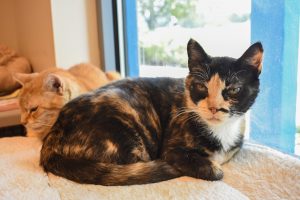 Agnes keeps her eyes open and her heart roaring and her prayers — surely the very breath of a cat is a form of prayer — pounding, even when the gate seems locked and rusty and the world whiffs her with disappointment (e.g. Danielle stops playing Pitbull’s Greatest Hits in the office; that volunteer with the angel eyes goes back to college; Betty and Toulouse decline to participate in Agnes’s multi-level marketing scheme to sell tiny sculptures of her own face).
Agnes keeps her eyes open and her heart roaring and her prayers — surely the very breath of a cat is a form of prayer — pounding, even when the gate seems locked and rusty and the world whiffs her with disappointment (e.g. Danielle stops playing Pitbull’s Greatest Hits in the office; that volunteer with the angel eyes goes back to college; Betty and Toulouse decline to participate in Agnes’s multi-level marketing scheme to sell tiny sculptures of her own face).
Agnes waits for her ship, waving her bandanna and her genuine, generous smile at other liners as they leave, knowing that what’s meant for her will not pass.
Agnes knows: you have to walk pretty far out on the limb if you want to see the robin’s eggs (which, in this case, are of course a metaphor for “those mystical tubes of tuna Go-Gurt that are sufficient proof of the existence of a loving God”).
Agnes urges us to be open, even when we feel ancient; to ask and seek and knock and know that we are being loved into existence, every instant of our existence.
It’s not too late. You’re not too far gone. Let’s get to it, kittens.
